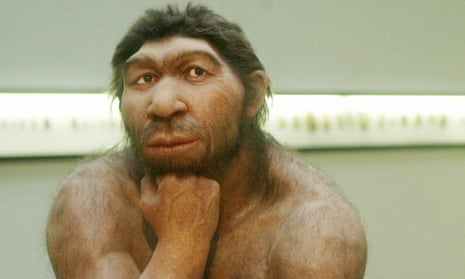Passionate encounters between ancient humans and their burly cousins, the Neanderthals, may have left modern people more prone to sneezes, itches and other allergies, researchers say.
The curious legacy comes from three genes that crossed into modern humans after their distant ancestors had sex with Neanderthals, or their close relatives the Denisovans, more than 40,000 years ago.
The prehistoric couplings left all non-Africans today carrying 1-6% of Neanderthal DNA. People whose ancestors never left the continent would not have crossed paths with Neanderthals or the Denisovans, a mysterious group of humans who lived in and around Siberia at the same time.
The three genes are among the most common strands of Neanderthal and Denisovan-like DNA found in modern humans, suggesting they conferred an evolutionary advantage. They probably boosted the immune system, since the genes are involved in the body’s first line of defence against pathogens such as bacteria and fungi.
But people who carry the three genes seem to pay a price in the form of an overly-sensitive immune system. One study by the US genetics company 23andme found that carriers of the genes were more likely to have asthma, hay fever and other allergies.
The genes are thought to have spread through modern humans when small groups of pioneers who left Africa met and had sex with Neanderthals already long at home in Eurasia. Unlike the new arrivals, the Neanderthals had spent 200,000 years adapting to life in the region, and their immune systems had become tuned to the new infections they faced.
“A small group of modern humans leaving Africa would not carry much genetic variation,” said Janet Kelso, who led the research at the Max Planck Institute for evolutionary Anthropology in Leipzig. “You can adapt through mutations, but if you interbreed with the local population who are already there, you can get some of these adaptations for free.”
Kelso’s team scanned the genomes of modern day humans for evidence of Neanderthal or Denisovan genes and then looked at how common they were in people from around the world. Among the three immune system genes that stood out, two closely matched Neanderthal DNA. The most common was found in all non-Africans, the other only in Asians. The third gene was more similar to Denisovan DNA and much rarer, found in only a handful of people from Asia who took part in the study.
The findings suggest that modern humans inherited Neanderthal and Denisovan genes in three waves depending on where and when the groups met. The genes proved so beneficial that they remain in our genomes to this day. The study is reported in the American Journal of Human Genetics.
The work is backed up by separate research published in the same journal by scientists at the Pasteur Institute in Paris. Geneticist Lluis Quintana-Murci analysed DNA from participants in the 1000 Genomes Project and compared their DNA with ancient human genomes. He focused specifically on 1500 immune genes and found that most adaptations occurred in the past 6,000 to 13,000 years, when humans shifted from a hunter-gatherer lifestyle to farming.
But Quintana-Murci said the most striking discovery was of the same three genes that Kelso found. In his study, the trio of genes were among the most common Neanderthal or Denisovan DNA found in modern people.
“Interbreeding with archaic humans does indeed have functional implications for modern humans,” Kelso said. “The most obvious consequences have been in shaping our adaptation to our environment - improving how we resist pathogens and metabolise novel foods.”
For all the benefits they bring, the downsides of Neanderthal genes might not be so bad. “They might have increased our susceptibility,” said Kelso. “But I wouldn’t go so far as to say Neanderthals gave us allergies.”

Comments (…)
Sign in or create your Guardian account to join the discussion